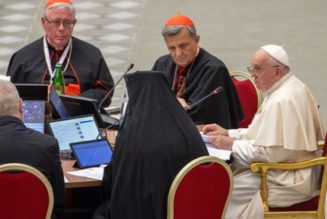
Last week, I went to confession at a shrine near me, which I will not name. It was one of those infuriating confessions in which you try to convince the priest that what you are confessing, though not in the “mortal sin” category, is still sinful. He was polite, gentle, and meant well, I think. But his overall message was completely therapeutic, without the slightest indication that he even believed in the concept of sin (short of murder or piracy on papal waters).
Everything he said to me was geared toward making sure I understood that all of the circumstances surrounding my actions were utterly reducible to rather typical psychological factors that so mitigated my guilt as to make my entire confession seem like an exercise in runaway scrupulosity. In the end, what he really seemed to want was to make me feel more guilty about coming to confession in the first place than about my actual sins.
Even if my confessional experience is not the norm, it is expressive in an almost cartoonish way of the entire approach to moral theology “from below” that so characterizes the overall project of the current papacy and of a certain kind of pastoral theology that has been deeply influential in the Church for these past 60 years. In short, even as I robustly affirm that Pope Francis is not a heretic, I also affirm that he has put forward a model of pastoral practice that is overly horizontalist, psychologistic, and strangely lacking in any strong mystagogical orientation to the supernatural realm of grace.
This papacy, in other words, is my confessional experience writ large.
The subjective over the objective
In the grand interplay between the various components that go into the making of a moral act there are always objective and subjective considerations as part of the equation. While the tradition has always emphasized the objective pole as the proper starting point, Pope Francis and his allies have tended to treat that objective orientation as somehow expressive of a certain pastoral heartlessness and rigidity which must now be counteracted by a reforming of moral theology “from below.” And it will be guided less by theological “doctrines” and more by the psychological and sociological sciences. These disciplines, they say, can embellish and deepen our understanding of the subjective pole and make for a less pastorally rigid approach to real human beings in the full, existential reality of their concrete situations. Once situated, the subjective pole of human moral action should then become a far more determinative starting point than ever before.
Notice, for example, how Cardinal Fernandez in Fiducia Supplicans (FS) justifies his novel development of the notion of completely non-sacramental sacramentals, wherein priestly blessings for homosexual couples who aren’t being blessed as couples but merely as individuals presenting themselves as a couple, are now allowed: “The Church, moreover, must shy away from resting its pastoral praxis on the fixed nature of certain doctrinal or disciplinary schemes” (25). There is a sense here, and throughout FS, of placing the Church’s moral doctrine against concrete pastoral practice, with the former being viewed as a kind of elitist form of “control” (e.g. doctrines as “schemes”). There is the constant tendency of turning commandments into mere “ideals”’ which, when actually treated as commandments, are dismissed as a form of theological “ideology” that is “backward”-looking in its orientation.
This is always the net result of moral theologies “from below,” which inevitably degenerate into experiments in incrementalism. The experiential tale begins to wag the ecclesial dog to such an extent that sexual behaviors once deemed objectively sinful in all circumstances regardless of motives, are transformed ultimately into virtues that are then promoted as genuine Gospel values.
The process by now is a shopworn one and is standard fare in the progressive playbook. Actions once deemed immoral are at first tolerated on “pastoral grounds of mercy”; then mainstreamed as “pelvic issues we have exaggerated too much and which are no big deal really”; then universally accepted, as the behavior comes to be viewed as “normal” and merely an expression of the goods associated with the pluriformity of human sexuality; then embraced as “actually containing many good and wholesome features”; and finally promoted as a moral good on a par with all other moral goods and without sinful taint of any kind.
Thus ends the grand reversal of values wherein the Church’s traditional moral teaching eventually comes to be seen as a villain to be overcome. And only those nasty “backwardists” will oppose this reversal and will be characterized as toothless, knuckle-dragging, backwater, ecclesial moonshiners.
By contrast, in traditional Catholic moral theology the key components for judging the quality of a moral act are the object of the act (what is being done), the intention (the deliberate willing of the object), the motive (why is it being done), and the various circumstances surrounding the act, which would include the subjective psychological state of the choosing person and all potentially mitigating factors.
Traditionally, the “object” was always given the highest priority in moral analysis since it is the single most important factor in determining exactly “what” is being chosen in the act. Pope John Paul, in line with Thomas Aquinas, states this clearly in Veritatis Splendor: “The morality of the human act depends primarily and fundamentally on the ‘object’ rationally chosen by the deliberate will”. Therefore, John Paul concludes that, “as the Catechism of the Catholic Church teaches, ‘there are certain specific kinds of behaviour that are always wrong to choose, because choosing them involves a disorder of the will, that is, a moral evil’” (#78).
Of course, Pope John Paul also takes into consideration the pastoral law of gradualism (Familiaris Consortio, 9) where those on the path of sanctification are treated with a delicate compassion and a boundless reservoir of forgiveness. But this is different from a “gradualism of the law” in which absolute negative moral norms are turned into mere “ideals” that we all approximate in various flawed ways and which, given my unique “circumstances”, may not bind me in any way at all. This kind of gradualism is explicitly disallowed by John Paul:
They cannot however look on the law as merely an ideal to be achieved in the future: they must consider it as a command of Christ the Lord to overcome difficulties with constancy. ‘And so what is known as ‘the law of gradualness’ or step-by-step advance cannot be identified with ‘gradualness of the law,’ as if there were different degrees or forms of precept in God’s law for different individuals and situations. (Familiaris Consortio, 34)
It is possible, I suppose, to make the case that nothing Pope Francis has taught contradicts directly or explicitly these more traditional aspects of moral theology. However, there is no denying that the overall tonality and ethos of this papacy is closer to that priest in my confession than it is to the theological thought of John Paul II and Aquinas. There might be a literal continuity according to the strict meanings of words, but the connotative aspects of this papacy are in the direction of a horizonatalist pastoral practice that not only ignores, but actively works against, a view of human life fundamentally open in deeply radical and constitutive ways to the movements of supernatural grace. There is little emphasis upon the real mystical elements of the faith, the reality of the transformative power of supernatural agency in our lives, and the nature of true discipleship as a call to “come up higher” via the path of self-renunciation. All the talk is instead about “mitigating factors” and “complex concrete circumstances” and of “God blessing me where I am right now without any judgment”.
Gift, not grift
Pope Francis has often said that the Church is like a field hospital. I really like that. However, a field hospital, as I have said before, is still a hospital and not a hospice. It is to be a place where our sins are healed from within using curative medicines, and not merely covered over superficially with bandages. Or, worse, judged to be no illnesses at all, with the patient declared a self-loathing hypochondriac who has imbibed the ideology of his oppressor and sent on his way with a meaningless 10-15 second blessing and a boutique shop book on self-acceptance.
The approach adopted is minimalist and overly avuncular, ignoring the fact that in the spiritual domain people come to the Church not only seeking comfort and compassion, but also inspiration via a positive proposal of Christological regeneration through the kenotic gift of self to others. People in need and distress can find comfort and compassion in many venues outside of the Church. But they come to the Church seeking something more—and that something more is the life of Christ crucified and risen. They do not seek the soothing dulcet tones of an Oprah Winfrey or a Dr. Phil. They can get that for free on TV and on the internet.
They are seeking a way out of their existential messes, and not a blessing of the mess as “the best you can offer to God right now.” What they seek are spiritual vocations and not latitudinarian vacations. And the missional vocations they seek are those, not of personal gain, but also of personal loss, where the gift of self for the sake of the Kingdom is the greatest gain of all.
Gift, not grift, is what they seek. But the endlessly “kind” Church that pits mercy against truth is a grift of the highest order. It is a counterfeit simulacrum of the Gospel which paints a false picture of Jesus as a moral antinomian who apparently, when reaching out to those on the margins, was endlessly kind but never challenged them to repentance. C.S. Lewis summed this approach up nicely in his book The Problem of Pain (1940), when he pointed out that the God of a kindness divorced from goodness is a false one: “We want, in fact, not so much a Father in Heaven as a grandfather in heaven – a senile benevolence who, as they say, ‘liked to see young people enjoying themselves.’” He goes on to point out that kindness divorced from moral goodness is actually a veiled form of contempt:
Kindness, merely as such, cares not whether its object becomes good or bad, provided only that it escapes suffering. … It is for people whom we care nothing about that we demand happiness on any terms. … If God is Love, He is, by definition, something more than kindness. … He has never regarded us with contempt. He has paid us the intolerable compliment of loving us, in the deepest, most tragic, most inexorable sense.
Puncturing the immanent frame
I am reminded as well of the analysis of Charles Taylor in his magisterial tome A Secular Age (2007), wherein he argues that modernity is characterized by the construction of modern selves who are “buffered” against the intrusions of mystical, transcendent, supernatural elements into our psyches. Previous to modernity, human beings viewed themselves as more “porous” and open to being deeply influenced and transformed by supernatural agents. But with the rise of modern science and purely naturalistic and reductionistic explanations for the entire nexus of reality, including the human reality, it is no longer possible to view our lives as existing in relation to anything outside of this purely “immanent frame” of our experience.
What this argues for is a pastoral approach to modern, alienated persons that emphasizes the true power of supernatural regeneration in order to puncture the balloon of this immanent frame. In other words, now is not the time to back away from the strong supernatural claims of the Church but, instead, to double down on them with extreme prejudice. There is a reason that fantasy tales like Harry Potter and Lord of the Rings became so popular in our time. It is because we seek a re-enchantment of our lives. We are seeking magic again in a world dominated by the nihilism of the culture of digital techne. We seek some version of the “Benedict Option” and not modernity’s “Bonobo Option” where the social order is maintained via a series of manipulative sexual relationships.
One does not have to buy completely into Max Weber’s disenchantment thesis concerning modernity to see that there is a critical truth at play here. We seek God. And we seek him passionately. But modernity short-circuits that quest and fills the void with destructive, enslaving, and illusory idolatries.
And right at the very moment when the world is most ripe for a Christological re-enchantment, we get a rebarbative Church of psycho-blathering bromides about “listening” and “parrhesia” and “openness”, but all on a purely horizonatalist plateau and all safely within the immanent frame. Say what you will about traditional moral theology and its emphasis upon the object of the acting person’s choosing, at the very least it begins and ends with a fulsome, even prodigal, affirmation that we are more than pieces of thinking meat. That kind of traditional moral theology fits well within an enchanted world of supernatural connections.
The new moral theologies “from below” fit well into the world of buffered selves. And buffered selves showered with non-liturgical priestly blessings are still buffered, and thus still bewildered, sans a deeper supernatural challenge.
I think that matters.
If you value the news and views Catholic World Report provides, please consider donating to support our efforts. Your contribution will help us continue to make CWR available to all readers worldwide for free, without a subscription. Thank you for your generosity!
Click here for more information on donating to CWR. Click here to sign up for our newsletter.









